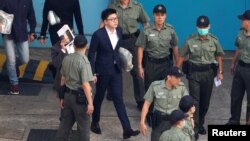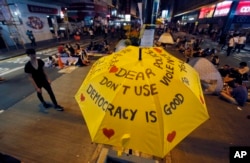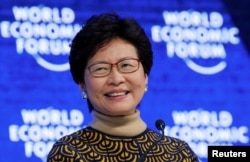Hong Kong political activists typically turn out in force for pro-democracy marches on July 1. But this year the mood is darker following recent prosecutions targeting some of the movement's highest-profile activists.
Three years after the city held massive sit-in protests for free elections, the so-called Umbrella Revolution of 2014, Hong Kong's judiciary has pursued activists, students and other participants, sending many of them to prison.
On June 11, Judge Anthea Pang sentenced Edward Leung Tin-kei to six years for rioting and assaulting a police officer. Another participant received seven years. They were by far the longest prison sentences for any defendant convicted of rioting.
To some in the opposition camp, Leung's sentence sends a powerful warning.
"For Edward's case, it is a very heavy sentence. It sends a very clear signal to society, especially the youngsters: Don't even try to go into the streets. You will be facing a very heavy and detrimental consequence," said Alvin Yeung, a barrister, lawmaker and Leung's former election opponent. "It is most discouraging, of course."
Critics say the case is part of a broader trend, with the government pursuing pro-democracy supporters using a colonial-era law, the Public Order Ordinance, to prosecute them for "disorder" and "unlawful assembly."
"It's an attempt to prevent further demonstrations by democrats," Chris Patten, the territory's last British governor, said in an interview. "I don't think anyone who is locking up kids from Mong Kok for seven years is in line with what the Hong Kong law said."
Crackdown began swiftly
Tens of thousands of people turned out for the Umbrella Revolution protests, which grew out of the movement pushing Beijing to approve a plan to let city voters elect Hong Kong's chief executive through democratic ballots, for the first time in history. Beijing scuttled that plan when it said all candidates needed its approval to run. Anger at Beijing's interference sparked the 79-day-long street occupation, which failed to win any concessions.
Shortly afterward, the Hong Kong government filed charges against several dozen activists and participants, many for leading peaceful demonstrations in the Chinese territory.
That action fed a so-called "localist" movement, of which Leung was a member. Localists strived to protect Hong Kong as an autonomous territory and demanded that Beijing limit the rising number of mainland visitors and residents. Some people, like Leung, campaigned for independence from China, a platform that President Xi Jinping himself ordered stopped.
After Leung's sentencing for his role in the movement, criticism of the punishment was swift. Lawyers and politicians said the judge had failed to justify such a long sentence of someone who had devoted himself to twice running for public office and had never been arrested until that night in February 2016.
Days after the police clash, Leung placed third in a legislative by-election and was seen as a shoo-in for a seat in the citywide elections that September. Instead, he was barred from running.
"I have seen no justification for it, particularly when put against the general fact this is a young person, his first offense. Aren't these things taken into account?" said Margaret Ng, a barrister and former lawmaker. "This is from beginning to end a political incident. Of course there was criminal law side. There is no denying it was a political incident."
The territory's chief executive, Carrie Lam, sought to silence criticism of the judge's work. "Everyone can express their views, but they should not … criticize and say that the court has made a political judgment, or say the law was used politically to give heavy sentences to pro-democracy activists," she told reporters.
Pro-Beijing politicians, including lawmaker Priscilla Leung, said Edward Leung's sentence would achieve the judge's stated ambition to deter violence.
Last July, Leung was invited to speak to a United Kingdom parliamentary seminar about the state of Hong Kong 20 years after Britain relinquished it to China. "At this moment, more than 100 protesters, most of them are in their 20s or early 30s, are facing different prosecutions, and some of them were sentenced for more than three years," he said. "While we are paying the price in Hong Kong, the international community needs to act."
In November, several activists will be tried for their role in leading the 2014 movement, including former students.












